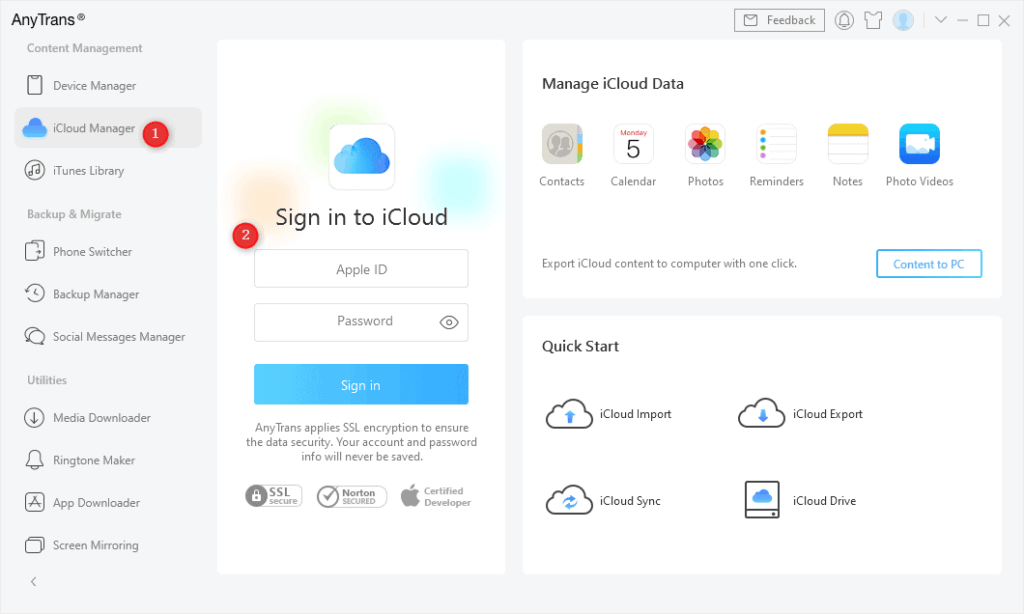iCloud, Apple’s cloud storage service, offers a convenient way to store photos, documents, and backups of your Apple devices. But this convenience comes with a security responsibility. Hackers are constantly devising new methods for iCloud hacking, exposing your sensitive data and compromising your privacy. This article talks about the most common methods hackers use to infiltrate iCloud accounts and equips you with preventative strategies to fortify your digital walls.
Methods of iCloud Hacking
While iCloud boasts robust security features, determined attackers can exploit vulnerabilities through various methods:
- Brute-Force Attacks: Hackers employ automated tools that systematically guess your password until they stumble upon the correct one. Weak passwords with common phrases or easily identifiable information are particularly susceptible.
- Phishing Scams: Deceptive emails or messages, meticulously crafted to mimic legitimate sources like Apple, can trick you into revealing your Apple ID and password. These messages often contain a sense of urgency or offer enticing rewards to lure you into clicking malicious links that lead to fake login pages designed to steal your credentials.
- Malware: Malicious software downloaded from untrusted sources can lurk on your device, capturing your keystrokes or login information when you access your iCloud account.
- Social Engineering: This tactic exploits human psychology. Hackers may pose as customer support representatives, friends, or even authority figures to manipulate you into divulging your login credentials or clicking on harmful links.
- Unsecured Public Wi-Fi: Connecting to unsecured public Wi-Fi networks exposes your data to potential eavesdroppers. Hackers can utilize tools to intercept data transmitted over these networks, including your iCloud login information.
- Outdated Software: Unpatched vulnerabilities in your operating system or iCloud software can create openings for hackers to exploit. Keeping your software up-to-date is crucial for maintaining optimal security.
- Compromised Devices: If a device you use to access iCloud becomes infected with malware or has weak security settings, it can provide a backdoor for hackers to gain access to your entire account.

Strategies to Prevent iCloud Hacks
By implementing these preventative measures, you can significantly reduce the risk of your iCloud account being compromised:
- Strong Passwords: The cornerstone of online security is a robust password. Use a combination of uppercase and lowercase letters, numbers, and symbols. Avoid using personal information like birthdays or pet names as these can be easily guessed. Consider a password manager to generate and store complex, unique passwords for all your online accounts.
- Two-Factor Authentication (2FA): Enable 2FA for your iCloud account. This adds an extra layer of security by requiring a second verification code, typically sent to your phone or another trusted device, in addition to your password when logging in.
- Beware of Phishing: Always scrutinize emails and messages claiming to be from Apple or other trusted sources. Check the sender’s email address for inconsistencies and avoid clicking on suspicious links or attachments. If unsure, contact Apple directly through a verified channel to confirm the legitimacy of the communication.
- Software Updates: Ensure your Apple devices and iCloud software are updated regularly. These updates often include security patches that address newly discovered vulnerabilities.
- Secure Wi-Fi Connections: Avoid using unsecured public Wi-Fi networks for accessing your iCloud account. If necessary, consider using a virtual private network (VPN) to encrypt your data while on public Wi-Fi.
- Beware of Social Engineering: Be wary of unsolicited calls, messages, or emails requesting your personal information or login credentials. Never share your iCloud credentials with anyone, even if they claim to be from Apple support.
- Monitor Your Account: Regularly review your iCloud login activity and device list. If you notice any unrecognized login attempts or devices, it’s a red flag. Immediately change your password and report the suspicious activity to Apple.
- Secure Your Devices: Use a strong screen lock on your devices and enable features like “Find My iPhone” to help locate or remotely wipe your device if it’s lost or stolen.
- Beware of Third-Party Apps: Be cautious when granting access to third-party apps with your iCloud credentials. Only grant access to reputable apps and revoke access if you no longer use them.
Recovering from an iCloud Hack
If you suspect your iCloud account has been compromised, act swiftly:
- Change Your Password: Immediately change your iCloud password to something strong and unique. Remember, don’t reuse this password for any other accounts.
- Enable 2FA: If you haven’t already, activate 2FA for your iCloud account to add an extra layer of security.
- Report the Hack: Notify Apple about the compromised account. Apple provides a dedicated online portal to report suspicious activity or a compromised Apple ID.
- Scan for Malware: Run a thorough scan of your devices with reputable antivirus and anti-malware software to identify and eliminate any malicious programs that may have compromised your security.
- Review Account Activity: Check your iCloud storage for any unauthorized files or changes. Consider changing passwords for any linked accounts, such as email or social media, if you suspect they might have been compromised as well.
- Seek Professional Help: If the situation seems complex, or you’re unsure about the next steps, consider seeking assistance from a reputable cybersecurity company like Polosploits.
Hiring a Hacker for iCloud Hack and iCloud Recovery
Polosploits is a trusted company specializing in helping victims of iCloud hacks regain control of their accounts and secure their data. Their team of cybersecurity experts offers a suite of services to assist you in recovering from a hack:
- Digital Forensics: Polosploits can analyze evidence to determine the nature and extent of the breach, helping you understand how your account was compromised.
- Account Recovery: They can guide you through the process of regaining access to your iCloud account and securing it with robust passwords and 2FA.
- Data Security Measures: Polosploits can advise on implementing robust security protocols to protect your devices and online accounts from future attacks.
Why Choose Polosploits?
- Experience: Polosploits boasts a team of seasoned professionals with extensive experience in dealing with various iCloud hacking scenarios.
- Success Rate: They maintain a high success rate in helping clients recover their accounts and secure their data.
- Confidentiality: They prioritize complete discretion throughout the recovery process, making sure your privacy is protected.
- Compassionate Support: Polosploits understands the emotional distress caused by an iCloud hack. Their team offers understanding and support throughout the recovery journey.
Your iCloud data holds a significant portion of your digital life. If your iCloud account is compromised, don’t hesitate to seek help. Polosploits can be valuable allies in regaining control of your account and securing your data.



